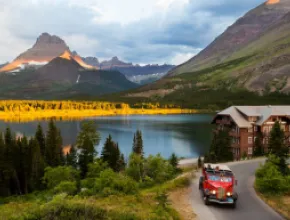The harsh environment of the desert may seem like one of the last places in need of a little environmental care and feeding, but underneath its prickly facade is a fragile ecosystem in need of stewardship.
The deserts of the Southwest U.S., in particular, are ripe for corporate social responsibility (CSR) activities for meeting groups who want to aid the environment while enjoying its reliably arid climate.
Following are five desert CSR activities and operators that have either given back to the ecosystem or worked in tandem with the environment to help its human residents.
Iskashitaa Refugee Network
The Iskashitaa Refugee Network offers CSR programs that reap the food bounty of the Tucson, Arizona, area while providing critical resources to help refugees integrate into the community.
The core mission of the nonprofit organization is to harvest wasted food—in particular fruit from citrus trees—in and around Tucson, offering the harvest to refugee communities such as Afghans, Bhutanese, Iraqis, Yazidis and Sudanese, as well as to local food banks and schools.

Photo: Iskashitaa Refugee Networks conducts CSR programs that harvests food for the needy.
We harvest all year round, with 97 kinds of food predominately from backyards, orchards and other areas around Tucson,” said Barbara Eiswerth, executive director of Iskashitaa Refugee Network. “We also run food preservation workshops that are generally from three to five hours. For smaller groups, up to approximately 16, we do cultural cooking classes.”
Eiswerth said Iskashitaa can accommodate groups of up to 50 for a Friday or Saturday program in which groups work side by side with U.N. refugees and asylum seekers primarily from Africa, Asia and the Middle East. The work is not too strenuous, Eiswerth said, with Iskashitaa using telescoping pickers to harvest the fruit.
One heartwarming option is the preparation of a meal with the refugees to learn about their cultural foods and traditions.
“We give them an introduction to the cuisine and the culture and a demonstration of the three or four things they are making,” she said, adding that the groups are separated into four stations in groups of four. “They come away with four recipes and four experiences of making the recipes, and then they sit down and share the meal together with the refugees and their families.”
The cost of the programs varies depending on how long the program is and how many participants will be involved, and Iskashitaa can work with the sponsoring organization to develop content they can share about the program in their organizational communications to spread the word of their good deed.
For their donation, however, groups will leave with an understanding of cultures they are most likely very unfamiliar with, as well as the incalculable feel-good of helping someone in need help themselves.
[Related: 7 Ways to Savor Sonoran Cuisine in Tucson]
“Getting to experience something side by side with someone who’s had a different life than you is quite an experience,” said Eiswerth, who added that Iskashitaa has worked with major corporations such as Raytheon and Texas Instruments. “And we’re not handing [the refugees] a handout. They’re giving back to the community that has given to them. It’s a genuine experience that humanizes something in the news that’s sometimes very negative. We’ve got the human stories to warm your heart.”
Tucson Clean and Beautiful
The national nonprofit Parent Heart Watch, which is focused on helping families cope with children who have suffered sudden cardiac arrest, worked with Tucson Clean and Beautiful to create a CSR program that helped both the local environment as well as memorialize members’ children who have passed on.
“In every city we go to, we want to leave a mark for our children to be remembered,” said Martha Lopez-Anderson, executive director of Parent Health Watch. “It’s something that families can go back to in the cities we’ve been to and see a tree growing in a special place to remember their children.”

Photo: Tucson Clean and Beautiful enlists meeting groups to plant trees in the Southern Arizona destination.
Lopez-Anderson said Parent Heart Watch provided attendees at its January 13-15, 2017 annual Heart to Heart conference, held in Tucson, with a rock and decoration supplies. The rocks were set up in a room at the conference for attendees to decorate, and Tucson Clean and Beautiful placed them in the shape of a heart around the base of one of the donated trees it planted in the organization’s name.
The CSR activity also benefits the environment by introducing more trees via a donation from the sponsoring organization.
Lopez-Anderson said Tucson Clean and Beautiful also brought one of the pre-planted trees wrapped in burlap to show attendees at the conference during the welcome dinner.
“We always do something different, but it always involves a tree,” Lopez-Anderson said. “We’ve also done bird feeders that dissolve, and then the seeds fall. We try really hard to do something that’s meaningful, and families go back and visit it, so they really do appreciate it.”
Tucson Clean and Beautiful also works to clean up local parks and washes and facilitate graffiti abatement and buffelgrass eradication. It can customize programs for individual groups for a small fee, including coordination, scheduling and logistics, and all necessary tools and supplies.
Arizona Sonora Desert Museum
Visit Tucson works with the Arizona Sonora Desert Museum to refer groups as part of its buffelgrass eradication efforts.
Buffelgrass is an invasive shrubby grass that crowds out native grasses in the area by competing for water and hindering the germination of seeds because of shading and its dense root system. Buffelgrass also can’t coexist with saguaro cactus, the iconic native plant of the Sonoran Desert.

“It’s the most urgent situation in Tucson from an environmental perspective because it’s very pervasive in the desert environment and very flammable,” said Jane Roxbury, convention services director for Visit Tucson. “Groups go out and pull up the grass. Usually there’s a leader or two that provides the volunteers with instruction as well as gloves, and they’re prepped in advance as to how to dress, since they’re out in the wild and there’s a lot of critters out there.”
Visit Tucson believes that CSR is an essential part of meetings and conventions in the destination, and its convention services team liaisons with meeting planners to recommend local organizations as well as provide services such as attendance-building tools, marketing support and meeting microsites.
“It’s so important to some groups that they plan it very well in advance, and they’ll have an option on their conference registration form for what activity they want to participate in, and a lot of times they’ll have a fee,” Roxbury said.
McDowell Sonoran Conservatory
In Scottsdale, Arizona, groups can pitch in to help the environment through the McDowell Sonoran Conservatory, which has an army of 650 steward volunteers dedicated to protecting the 30,000-acre McDowell Sonoran Preserve.
Volunteers maintain and patrol trails; offer guided hikes, mountain bike and equestrian rides; conduct scientific studies on wildlife and plant species; and provide ecological education and outreach programs.
Experience Scottsdale can help match meetings groups with the Conservatory, and also offers a dedicated section of its website detailing other CSR opportunities in the destination.
Friends of the Desert Mountains
Groups meeting in California’s Coachella Valley, which includes Palm Springs, can roll up their sleeves to help Friends of the Desert Mountains with weed-eradication efforts on trails winding through Santa Rosa and San Jacinto Mountains National Monument.
Friends of the Desert Mountains started acquiring land in the area more than 15 years ago and now conserves more than 50,000 acres in and around the Coachella Valley.
“We love to partner up with people—it’s a great thing that we do,” said Tammy Martin, executive director of Friends of the Desert Mountains. “For the longest time we used to say we were the best kept secret.”
Martin said that groups can either provide their own food and transportation for a morning activity or have Friends of the Desert Mountains arrange for both for a nominal fee.
“If it’s a huge group, especially with the weed pulls, we really don’t have a maximum capacity, but I’m sure we’d like to keep it under 60 because it gets to be too much to arrange everything,” Martin said, adding that Friends also holds fundraising events in the first weekend of March every year, and accepts volunteers to help manage their children’s and retail areas as well as assist with setup and teardown.
“It’s nice to have a month’s notice, but if it’s something that’s last-minute we will try to accommodate them. It just depends on what we have on our calendar,” she said, adding that groups who are interested in volunteering should call the organization at 760.568.9918 or send an email to friends@desertmountains.org.
How to Prepare for a Desert CSR Program
According to Visit Tucson’s Roxbury and Iskashitaa’s Eiswerth, groups venturing out for a CSR program in a desert environment should take the following precautions:
- Bring hats, sunglasses and other sun-shading, UV-protective clothing.
- Bring, or arrange for, gloves.
- Wear sturdy boots.
- Hydration is of the utmost importance, so bring a reusable water bottle and have plenty of water that is easily accessible.
- Bring plenty of sunscreen.
- Wear pants and shirts with long sleeves. Dress in layers, taking into consideration how the desert heats up in the afternoon. Long sleeves will help protect against thorns and sharp branches.
- Be vigilant of your surroundings at all times.
As with any CSR program, planners shouldn’t wait until the last minute to schedule an activity.
“Preparation is key, so provide as much advance notice as possible so the nonprofit has time to staff up and shepherd their group through the process,” Roxbury said. “Nothing’s worse than a bunch of people standing around waiting to volunteer.”
Roxbury also offered one key piece of advice for anyone venturing out in the desert.
“If the ground starts moving, be alert,” she said. “A lot of the critters can blend in with the ground.”
Read next: New Mexico Meetings Developments Reach ‘Breaking Bad’-Level Hype







